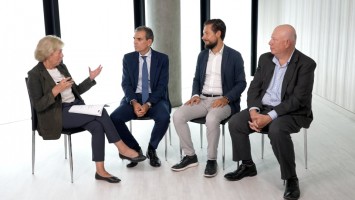Our study started based on the fact that there is a very high incidence of recurrence after resection of hepatocellular carcinoma while there are no currently approved approaches either pre-surgery or after surgery. So therefore it was an unmet need that led to our study design. Basically we initiated our study in a randomised fashion – 15 patients per arm, one arm is nivolumab alone, the other one is nivolumab plus ipilimumab based on the fact that recently in HCC we’ve seen some data about the higher incidence of responses with the combination. Historically, as well, at the time when we designed our study it was very obvious that the combination could have a higher response rate.
So we launched our study, a small study, 15 patients per arm, signal finding and safety profiling. Thus far we enrolled 26 patients, we have resected 20 total, five patients have achieved pathological complete response. So we obtain a biopsy, do the treatment every two weeks for nivo, one time only on day one for ipilimumab, and after six weeks we resected the HCC tumours. We found five of them completely necrotic, there were no cancer cells; two of them achieved major response in the form of major necrosis as well. Patients tolerated the treatment well, we didn’t have any delay or cancellation of surgeries based on any adverse events.
The next step is to launch a larger study and we are planning on launching a study in the US under the SWOG group. Also we’re talking to our collaborators in Germany and other European countries to launch another study in Europe focussing on nivolumab alone versus surgery, so it would be randomised. The reason for launching those large studies is this is only way to change the standard of care to compare to surgery alone based on the promising results that we have encountered.
One interesting data that we have found was also the fact that those initial patients who achieved major response, we analysed three out of them, compared them to six patients who didn’t have this kind of response. We were able to identify specific immune cell types that correlated with the major response that we have seen. This is what our presentation is going to be revolving around. Basically two cell populations from CD8 cytotoxic T-cells were found to be increased at baseline as compared to T-regulatory cells so the ratio was higher, CD8 cytotoxic cells to T-regulatory cells. In those patients that the ratio was higher in the beginning they responded the best and also the delta, the difference between CD8 cytotoxic T-cells and T-regulatory cells increased at the time of surgery in those patients who had achieved a complete response. So we think that our study could also highlight some signals in terms of hypothesis generating work for the larger studies. This is going to benefit not only our team but also other researchers in the field because we are expecting this approach to take off.








